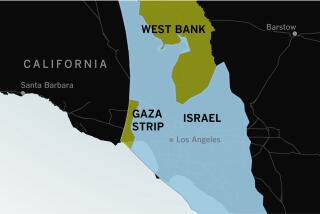Mexico Voids Conviction of Ex-President’s Brother
A judicial panel late Thursday voided the 1999 murder-conspiracy conviction of Raul Salinas de Gortari, the brother of a former president, overturning a verdict that Mexicans had applauded as proof that the politically mighty were no longer above the law.
The three-judge panel’s ruling on a defense appeal could clear the way for the flamboyant multimillionaire’s release after more than 10 years in prison. He is serving a 27 1/2 -year sentence for the 1994 shooting of Jose Francisco Ruiz Massieu, a political rival who was the No. 2 official in Mexico’s long-ruling Institutional Revolutionary Party, or PRI.
Salinas’ lawyers had argued on appeal that the conviction was based on hearsay and tainted by payoffs from the prosecutor to at least three witnesses whose testimony helped convict the businessman of masterminding the killing.
Although the panel did not make its reasoning public, the decision bolstered the verdict of some historians: The wealthy brother of former President Carlos Salinas de Gortari was guilty of profligate corruption but ended up in prison after a flawed trial that moved ahead only because it confirmed his darkest image in the public mind.
“It’s definitive ... the last word,” said the chief defense lawyer, Alonso Aguilar Zinser, after hearing the verdict. “Raul Salinas is innocent.” The lawyer said he would file a brief today asking for his 58-year-old client’s release from Santiaguito prison outside Mexico City, and expected him to be out early next week.
Mexican Atty. Gen. Daniel Cabeza de Vaca said during a visit to Washington this week that the government would respect the court’s decision.
Salinas still faces trial on charges of illicitly enriching himself through influence peddling during his brother’s six-year presidential term, which ended in December 1994, three months after the killing for which he was tried.
He would be eligible for bail, but legal experts said federal prosecutors could ask a judge to deny it.
He also faces money-laundering charges in France, which has issued an international warrant for his arrest, and in Switzerland. The charges there stem from allegations that at least part of the $90 million seized from his Swiss bank accounts were payoffs from drug-trafficking cartels in exchange for protection.
Freedom for one of the most scandalous figures of the PRI’s last years in power is expected to generate a storm of protest from rival political parties. But a spokesman for President Vicente Fox, whose election in 2000 ended the PRI’s 71-year grip on the presidency, said he did not think the reversal “would have political repercussions or generate conflict.”
Raul Salinas’ imprisonment has been part of the soap-operatic saga of a once-almighty family’s declining fortunes.
The so-called “uncomfortable brother” amassed a fortune during Carlos Salinas’ presidency, acquiring two ranches along with homes in La Jolla, Aspen and New York, and bank accounts in the Cayman Islands, London and Switzerland. When the president forced him to retire from government in 1992, he declared that he never earned more than $190,000 a year as a bureaucrat.
Two years later, Carlos Salinas left office as a relatively popular president, but his reputation collapsed with the nation’s currency a few weeks later. Many Mexicans blamed the loss of their homes, cars, jobs and savings on the former president, who went into self-imposed exile in Ireland in 1995. And they were ready to vilify Raul Salinas.
Raul Salinas repeatedly maintained his innocence, claiming to be a scapegoat for the economic misfortunes blamed on his brother. The businessman was arrested in February 1995 just as the new PRI president, Ernesto Zedillo, was trying to distance himself from his predecessor.
The crime for which Raul Salinas was accused, the slaying of the PRI’s secretary-general on a Mexico City street, had horrified the country. Ruiz Massieu had been married to a sister of the Salinas brothers and was a considered a rival of Raul for influence in the party.
The alleged gunman, captured at the scene, told police that he had been hired for the hit by the chief of staff of a PRI congressman who disappeared the following day.
As rumors circulated that Raul Salinas was behind the killing, Mexicans witnessed a bizarre criminal investigation. The dead man’s brother, Mario Ruiz Massieu, was appointed special prosecutor, only to resign after he was accused of covering up for the assassins. He later committed suicide in an American jail after being arrested at Newark airport outside New York City and accused of trying to smuggle $9 million in drug bribes into the United States.
The next special prosecutor, Pablo Chapa Bezanilla, built his case after visiting one of Raul Salinas’ ranches with a clairvoyant, who said she proceeded to follow “vibrations” to unearth human bones. The prosecutor suggested that the bones belonged to the missing congressman; they turned out, however, to be those of a relative of the clairvoyant.
Defense lawyers centered their appeal on an allegation that the prosecutor had paid $500,000 to the family of his key witness, Fernando Rodriguez, the missing congressman’s chief of staff, after Rodriguez changed his testimony and implicated Salinas. Rodriguez is serving a 37-year sentence for his role in the killing.
In a prison interview with the Financial Times last month, Salinas admitted for the first time that he had exploited his political connections to get rich. But he said that most of his confiscated wealth had come from Mexican businessmen to set up an investment fund and should be returned to them.
The family’s troubles extended to the youngest brother as well. In December, Enrique Salinas was found strangled in a parked car, his head stuffed in a plastic bag. The wealthy engineer had also been under investigation in France for money-laundering.
More to Read
Start your day right
Sign up for Essential California for news, features and recommendations from the L.A. Times and beyond in your inbox six days a week.
You may occasionally receive promotional content from the Los Angeles Times.






